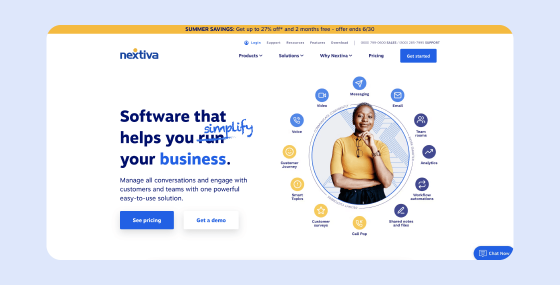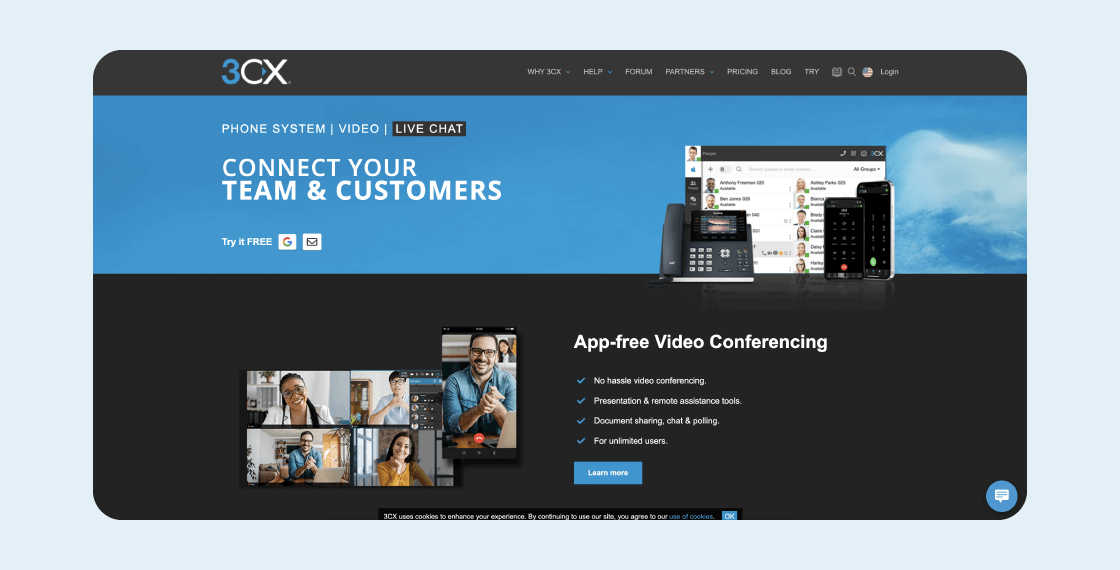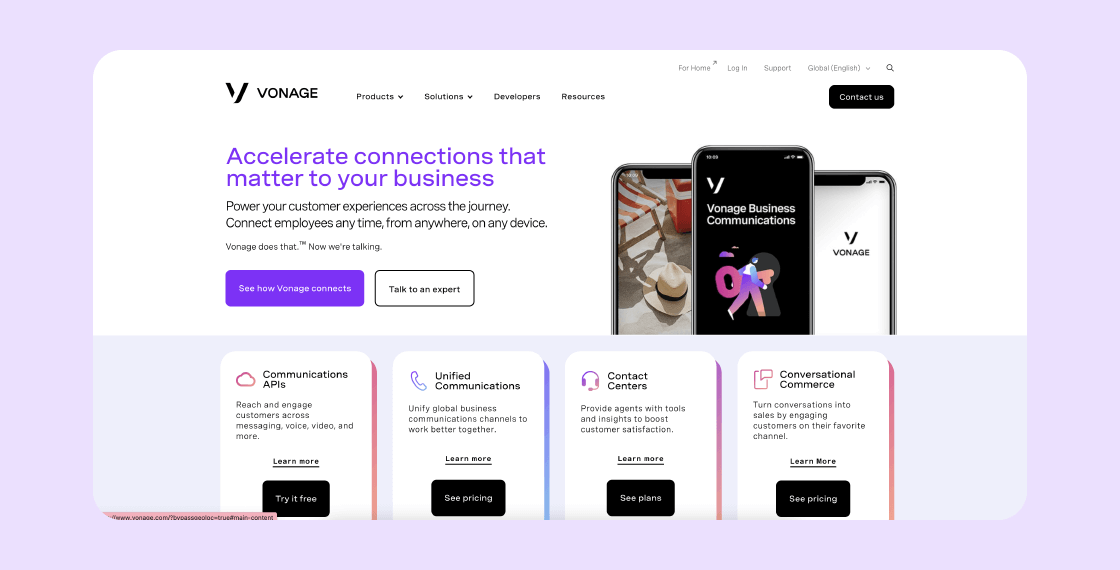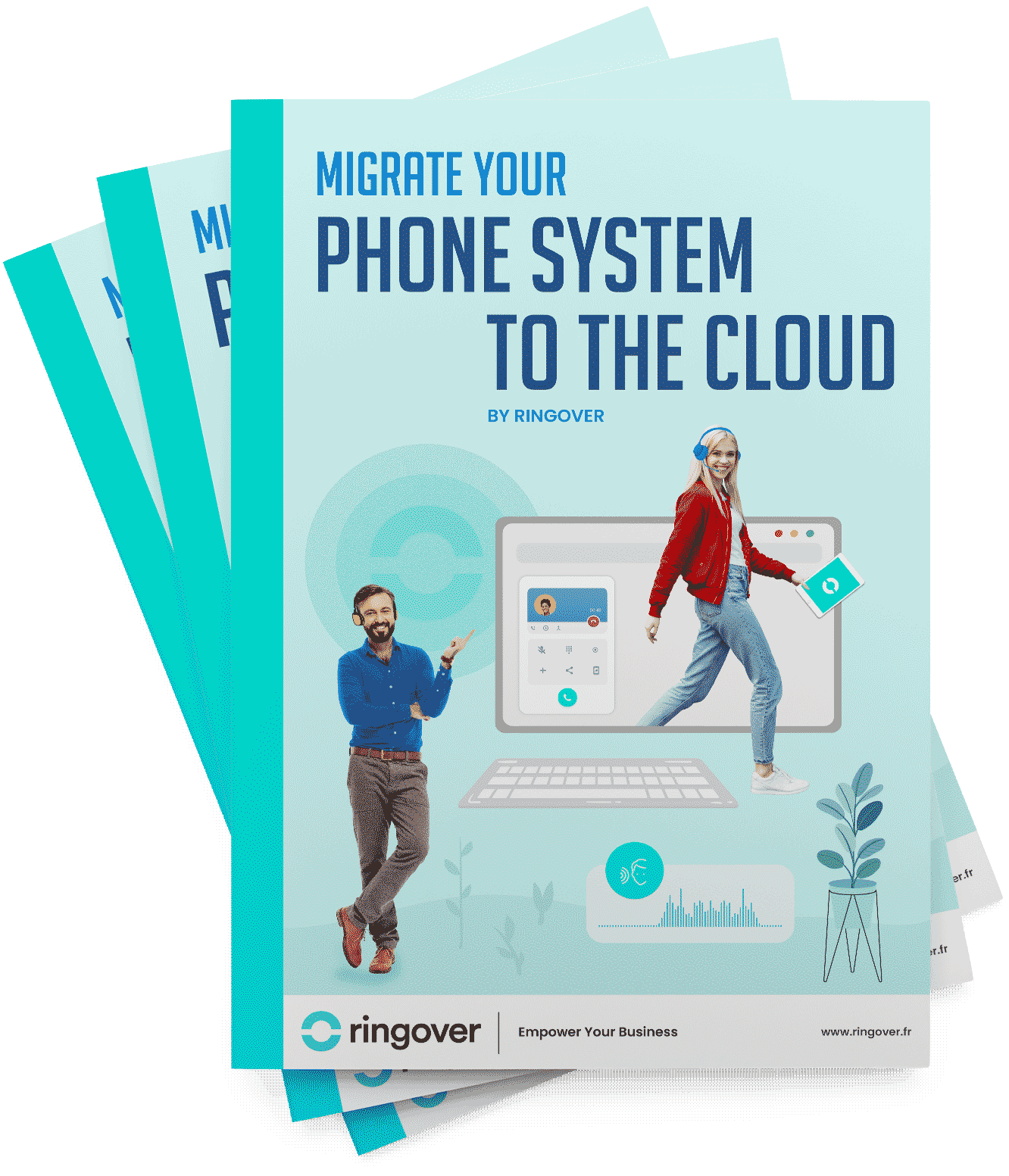Summary
- What is a softphone?
- Understanding Softphone Technology
- Key Benefits of Using a Softphone for Business
- Core Features of a Business Softphone
- How to Choose the Best Softphone for Your Business
- Top Paid Softphone Solutions for 2026
- Top Free Softphone Options
- Paid vs. Free Softphones: A Business Perspective
- These were the most popular softphones in 2026
- Softphone Frequently Asked Questions (FAQ)
- Citations
What is a softphone?
A softphone is a software application that allows you to make and receive phone calls over the internet, effectively turning your computer, smartphone, or tablet into a business phone. Using Voice over Internet Protocol (VoIP) technology, softphones have become essential tools for modern businesses, supporting remote work, increasing flexibility, and often reducing communication costs.
Understanding Softphone Technology
Before diving into the top providers, it's important to understand the fundamentals of how softphones operate and the different forms they can take.
How Does a Softphone Work?
Softphones use VoIP technology to transmit voice and video calls as digital data packets over the internet. When you place a call using a softphone application:
- Your voice is converted from an analog signal into digital data packets.
- A command is sent from your software to your VoIP provider's server.
- The server routes the data packets over the internet to the recipient's device.
- At the recipient's end, the data packets are reassembled and converted back into an audio signal they can hear.
This entire process happens in near-real-time, enabling clear and reliable communication without the need for traditional telephone lines.
What are the Different Types of Softphones?
Softphones are available across various platforms to suit different work styles and device preferences.
- Desktop Softphones: Applications installed directly onto a computer. They are available for all major operating systems, including Windows, macOS, and Linux, offering a full-featured communication hub for office-based or remote employees.
- Mobile Softphones: Available as apps for iOS and Android, mobile softphones allow you to manage your business line from your smartphone. This ensures you can make and receive work calls from anywhere without using your personal number.
- Web Softphones: Web-based applications that run directly in your browser. No installation is required; users simply log in to their account on the provider's website to access their phone system.
Key Benefits of Using a Softphone for Business
Adopting a softphone solution offers numerous advantages that can significantly impact a company's operations and bottom line.
- Greater Mobility and Flexibility: Softphones untether communication from a physical desk. Employees can make and receive business calls from any location with an internet connection, making it an ideal solution for remote and hybrid work models.
- Reduced Costs: By using VoIP, businesses can achieve significant savings compared to traditional phone systems. Most softphone plans include unlimited calling within certain regions, and there are no hardware or maintenance costs associated with on-premise phone exchanges.
- Enhanced Productivity: Professional softphones come with features designed to save time and streamline workflows. Tools like click-to-call, power dialers, and CRM integrations automate repetitive tasks, allowing teams to focus on more valuable activities.
- Scalability: Softphone systems are highly scalable. Adding or removing phone lines for new or departing employees can be done in minutes through a simple admin dashboard, allowing your phone system to grow seamlessly with your business.
- Centralized Communications Management: Some solutions provide a unified platform for all your business communications. You can manage multiple virtual numbers for different departments (sales, support, etc.) through a single, easy-to-use infrastructure.
Core Features of a Business Softphone
Beyond standard calling, modern business softphones offer a suite of advanced features to improve communication and collaboration.
- Call Management: Features like call recording, call transfer, call hold, custom greetings, and advanced call routing (IVR).
- Productivity Tools: Assisted dialing (Click-to-Call, Power Dialer), voicemail drop, and post-call note-taking and tagging.
- Unified Communications: Instant messaging, video conferencing, and SMS/MMS messaging from your business number.
- Analytics and Reporting: Access to detailed call logs, performance dashboards, and call history for the entire company.
- Integrations: Compatibility with third-party business software, such as CRM and helpdesk platforms, to sync data and streamline workflows.
- Security: End-to-end encryption to protect business conversations from unauthorized access.
How to Choose the Best Softphone for Your Business
Finding the right softphone requires evaluating your specific business needs against the features and capabilities of available solutions.
Key Evaluation Criteria
Consider the following factors when comparing softphone providers:
- Functionality: Does the softphone offer the essential features your team needs, such as call recording, IVR, or a power dialer?
- Integrations: Can the softphone connect with your existing CRM, helpdesk, or other critical business tools? A large integration library is a key strength of top providers.
- Call Quality and Reliability: Look for providers that guarantee high-quality audio, even in low-bandwidth conditions, and offer service level agreements (SLAs) for uptime.
- Ease of Use: The interface should be intuitive for all users, from agents to administrators, to ensure quick adoption and minimal training.
- Scalability: The solution should be able to support your business as it grows, allowing you to easily add users and features.
- Security: Ensure the provider complies with data protection regulations and offers features like end-to-end encryption.
- Customer Support: Check for the availability and responsiveness of technical support, as this is crucial for business continuity.
Free softphone use has become widespread across businesses in recent years. The popularity of softphones is mainly due to how efficient it is, and the fact that it supports working remotely and the widespread use of smartphones and tablets.
If you've come to this page, you've probably asked yourself questions like:
- How do softphones work?
- Are they suitable for my telephony needs?
- How do I choose the best softphone for my business?
- What are the advantages and disadvantages of softphones?
Top Paid Softphone Solutions for 2026
The business softphone market is competitive, but several providers stand out for their comprehensive features, reliability, and value.
1. Ringover US
Ringover US (ringover.com) is a versatile softphone solution designed to meet the communication needs of both sales and customer support teams. As a cloud-hosted unified communications platform, Ringover combines tools for prospecting, internal collaboration, and customer service into one intuitive interface. It's an all-in-one solution that provides both the softphone software and the VoIP service.
Key Features & Pricing
- SMART ($21/user/month): Unlimited calls to 110 destinations, local numbers in 43 countries, IVR, call recording, and video conferencing.
- BUSINESS ($44/user/month): All SMART features, plus local numbers in 65 countries, advanced IVR, SMS campaigns, and two business tool integrations.
- ADVANCED ($54/user/month): All BUSINESS features, plus a power dialer, voicemail drop, and a Smart IVR with voice recognition.
2. Nextiva
Nextiva is a cloud communications platform[3]. It provides a softphone with the basics like voice, video, instant messaging, and internet fax.
Key Features & Pricing

- Essential ($25.95/user/month): Unlimited voice and video calls, voicemail, internet fax, and integrations with Microsoft 365 and Google Workspace.
- Professional ($30.95/user/month): Adds screen sharing, SMS messaging, and integrations with HubSpot and Salesforce.
- Enterprise ($40.95/user/month): Includes voicemail transcription, call recording, and unlimited video conference participants.
3. 3CX
Unlike most providers on this list, 3CX is not a VoIP operator; it provides the softphone software but not the virtual phone lines. It's a cost-effective solution for businesses that already have a SIP trunk provider and need a system to manage communications, video conferencing, and team collaboration.
Key Features & Pricing

- 3CX Free: Free for up to 10 users with SIP trunk support, WhatsApp integration, and video conferencing for 25 participants.
- 3CX SMB ($14/year for 10 users): Adds multi-level IVR, call monitoring, and advanced call routing.
- 3CX Pro ($25/year, 4 simultaneous calls): Includes CRM integration, SMS messaging, and call recording.
4. Vonage
Vonage's softphone is part of the Vonage Business Communications (VBC) solution, which unifies calls, messaging, and video conferencing on a single platform. It is known for its customization options[4].
Key Features & Pricing

- Mobile ($19.99/user/month): Core mobile and desktop app features.
- Premium ($29.99/user/month): Adds multi-level auto attendant and CRM integrations.
- Advanced ($39.99/user/month): Includes on-demand call recording and visual voicemail.
Top Free Softphone Options
For individuals or small businesses with very basic needs, free softphones can be a starting point. However, it's crucial to understand that these solutions typically do not include a phone line or calling plan; you will still need to contract with a VoIP or SIP trunk provider.
- Bria Solo Free: Developed by Counterpath, Bria Solo Free is the successor to the popular X-Lite softphone. It offers more advanced features than its predecessor and allows you to connect a single device.
- Zoiper Free: Zoiper is a flexible softphone that supports voice and video calls. It places a strong emphasis on security, offering end-to-end encryption for conversations.
- 3CX Startup Free: The free version of 3CX provides essential features like SIP Trunk support, call groups, and video conferencing, making it a robust option for businesses that can source their own VoIP service.
Paid vs. Free Softphones: A Business Perspective
While free softphones can handle basic calling, they lack the features, reliability, and support necessary for most business operations. Paid solutions are designed to meet professional demands for security, quality, and functionality.
| Feature | Free Softphones | Paid Softphones |
|---|---|---|
| Functionality | Basic calling features. Advanced tools like IVR, power dialers, and analytics are typically absent. | Comprehensive suite of advanced features for call management, productivity, and analytics. |
| Integrations | Rarely offer integrations with CRM, helpdesk, or other business software. | Extensive integration libraries with popular platforms like Salesforce, Zendesk, and Microsoft 365[5]. |
| Security | Security levels vary. May not comply with business data protection laws or offer robust encryption. | High-level security with end-to-end encryption and compliance with regulations like GDPR. |
| Support | Limited to no technical support. Users are often left to rely on community forums. | Dedicated customer and technical support with service level agreements (SLAs) for business continuity. |
| Quality of Service | Call quality can be inconsistent and depends heavily on your internet connection. No uptime guarantees. | Providers use advanced codecs and redundant infrastructure to ensure high call quality and reliability. |
These were the most popular softphones in 2026
| Softphone | Supported platforms | User interface | Functionalities | Audio quality | Pricing |
|---|---|---|---|---|---|
| Ringover | Windows, macOS, Linux, iOS, Android | Intuitive and easy to use | Comprehensive, including calling, video calling, messaging and collaboration | Excellent | Varies according to the plan selected |
| Quicktalk | Windows, macOS, iOS, Android | Simple and straightforward | Voice calls | Good | Varies according to the plan selected |
| RingCentral | Windows, macOS, iOS, Android | Professional and well organized | Comprehensive, including calling, conferencing and collaboration | Good | Varies according to the plan selected |
| Nextiva | Windows, macOS, iOS, Android | Intuitive and accessible | Comprehensive, including calls, messaging, collaboration and analytics | Good | Varies according to the plan selected |
| Zoiper | Windows, macOS, Linux, iOS, Android | Varied and adaptable | Basic and some advanced | OK | Free versions with limited functionality, paid versions available |
| CloudTalk | Windows, macOS, iOS, Android | Modern and easy to use | Comprehensive, including calls, messaging, collaboration and analytics | OK | Free versions with limited functionality, paid versions available |
| 3CX | Windows, macOS, Linux, iOS, Android | Variety of options, adaptable | Comprehensive, including calls, messaging, collaboration and analytics | Good | Free versions with limited functionality, paid versions available |
| Vonage | Windows, macOS, iOS, Android | Professional and well organized | Comprehensive, including calls, messaging, collaboration and analytics | Good | Varies according to the plan selected |
Softphone Frequently Asked Questions (FAQ)
What is a free softphone?
A free softphone is a software application that lets you make calls over the internet without a subscription fee. However, you typically need to purchase a separate calling plan from a VoIP provider to make outbound calls to traditional phone numbers.
Can I use a free softphone for business calls?
Yes, but with significant limitations. Free softphones lack the advanced features, security, and dedicated support that businesses require. They are generally not suitable for anything beyond very basic use by individuals or micro-businesses.
Are free softphones secure?
Security varies widely between applications. It is essential to verify that any solution you use complies with data protection laws and offers end-to-end encryption to protect your business conversations. Paid solutions almost always offer superior security measures.
How do I install a softphone?
For desktop or mobile softphones, you download the installer or app from the provider's website or an app store (Google Play Store, Apple App Store). For web-based softphones, no installation is needed; you simply log in through your web browser.
What hardware do I need to use a softphone?
You can use a softphone on any compatible computer (Windows, macOS, Linux), smartphone (iOS, Android), or tablet. For the best audio quality and to minimize background noise, using a dedicated VoIP headset is highly recommended.
Citations
- [1] https://tech.co/business-phone-systems/cloud-phone-system
- [2] https://www.devopsschool.com/blog/top-10-business-phone-systems-voip-tools-in-2025-features-pros-cons-comparison/
- [3] https://getvoip.com/blog/business-phone-systems/
- [4] https://www.business.com/categories/business-phone-systems/
- [5] https://www.techradar.com/best/best-business-phone-system
Published on August 26, 2024.


